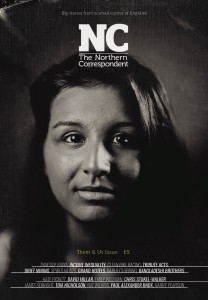Many of us are immigrants, refugees or their descendants – a point not lost on the north east’s community of Reform Jews, says Alice Bondi
A typically Jewish story concerns a man stranded on a desert island for many years, proudly showing off all he had constructed during his time there to those about to take him home. “But why have you built two synagogues?” the rescuers asked. “THIS one is the synagogue I always go to on shabbat. THAT one is the synagogue I’d never set foot in.”
The importance of the synagogues we don’t go to is strong in the consciousness of Jews. It is less a matter of defining ourselves by what we are not, than of respecting the many strands of Judaism. Unlike Christianity and Islam, where different denominations are based on theology, the Jewish movements largely agree on such matters, and are affiliations of those holding similar views on how literally scripture should be understood, and how far Jewish mitzvot (the 613 “commandments” or requirements) can be interpreted in the context of the modern world. These differences have existed for millennia and are not fixed; hence the movements vary from country to country and over time.
Within the broadly Orthodox stream, there are two main movements in the UK – Modern Orthodox and Charedi – while the Progressive grouping includes Liberal, Reform and Masorti. Just to confuse everyone (even Jews), the US Reform movement is very different from the UK Reform movement….
As is often said, “two Jews, three opinions”.
But while the concerns of Jews in the north east are very similar to those of other people in the area, the history of our communities over the millennia perhaps makes us more sensitive to the suffering of those who are increasingly economically deprived, and refugees. We are involved with initiatives such as the People’s Kitchen, with support for refugees, and of course in various inter-faith initiatives aimed at working towards making our area, our country, and the world a better place.
Jewish history is unfortunately full of prejudice and discrimination, violence and expulsion. We know what a toll this can take on individuals and their communities; whether we have personally experienced any form of prejudice or not, we are aware of our collective and family histories and it is unsurprising that so many Jews have been active in campaigns and organisations dedicated to supporting victims and attempting to bring it to an end. Many have expressed their sense of empathy with the refugees currently fleeing Syria, Eritrea, Nigeria and elsewhere, leading to practical action and financial support of organisations dedicated to helping those who have had to leave all they know.

Syrian refugees arriving on the island of Kos in August. Photograph by Oğuzhan Ali under Creative Commons licence
Given the expulsion of Jews from England in 1290, a law only rescinded in 1696, and full emancipation finally granted in 1858, it’s not surprising that the early 19th century Jewish population of England was small. However, there is evidence of Orthodox synagogues on Tyneside from the 1820s, and of Charedi communities by mid-century. Jews from Russia and eastern Europe fleeing persecution swelled local numbers considerably in the later 19th century.
But the Reform Movement (largest and oldest of the Progressive strands), formally established in Germany in 1810, and with synagogues in the UK by the mid-19th century, didn’t have a formal presence in the north east until 1962. German Jews who had arrived as refugees, before and after the Holocaust, wanted to establish a synagogue where their children could be educated in Jewish religious tradition. With the help of the nearest Reform synagogue (in Leeds), Newcastle Reform Synagogue (NRS) was established, meeting in homes, church halls and schoolrooms, before buying a former Methodist church which became the synagogue from 1963-74. Unfortunately, the building was compulsorily purchased, so it was back to homes and halls, transporting the Torah scroll on each occasion. Finally, in 1982, the construction of a purpose-built synagogue at The Croft, off Kenton Road, was completed.
Newcastle’s Reform Jews have had periods with a resident rabbi, part-time rabbi, or senior rabbinic student, and times when members of the community have led services. Despite declining numbers, we maintain weekly shabbat morning services, fortnightly erev shabbat (Friday night) services, and services for all the High Holy Days and Festivals. We are well-known for our monthly Friday night communal meals, catered for by one of our own members. In Reform Judaism, men and women sit together, and there have been women rabbis since the mid-1970s (several of whom have served NRS); this equality has been one of the hallmarks of Reform Judaism since its inception.
There is a small Reform congregation in Darlington, and a new Liberal community in York; but Newcastle Reform Synagogue acts as a centre for Progressive Jews over all of Northumberland and most of Cumbria (Blackpool being the only north-west England Reform synagogue north of Manchester), as well as those closer to home. Reform Jews drive on shabbat, so the community welcomes people from far afield, but the distances make it hard for the furthest-flung members to be regular attendees. We share the problem of declining numbers of full members experienced by Newcastle’s Orthodox community, but nonetheless organise many events, often attended by non-members (including members of the Orthodox congregation, who invite us to their events also).
Prediction is a difficult art; it is hard to know whether the dynamism of the Movement for Reform Judaism, ably led by the Movement’s Senior Rabbi Laura Janner-Klausner, will see a growth in numbers nationally or in the north east, but NRS continues the Jewish traditions of community life, celebration, commemoration and study.
Alice Bondi is a retired psychotherapist who lives in Alston Moor. You can follow her on Twitter.
Tell us your views in the comments section below – by clicking on the little speech bubble.
(Views expressed on our website and in our magazines and emails are not necessarily endorsed by The Northern Correspondent.)
Subscribe to our weekly email:
Buy our latest magazine:

